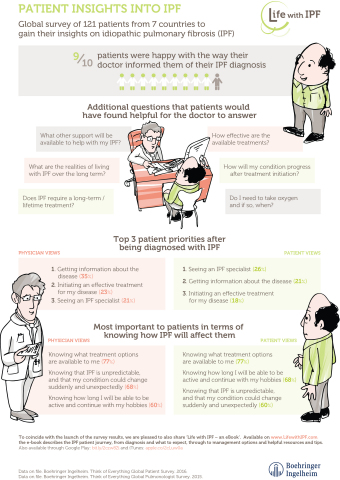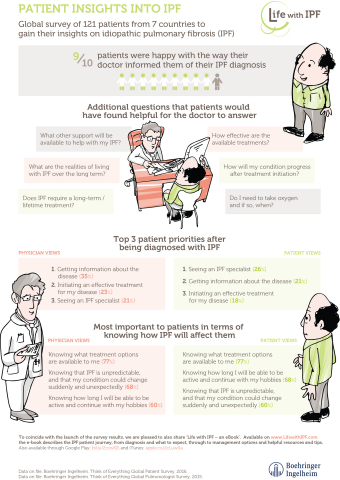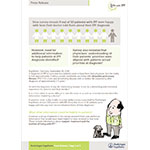INGELHEIM, Germany--(BUSINESS WIRE)--A diagnosis of IPF is news that few patients want to hear from their physician, but the reality is that approximately 3 million people worldwide are living with idiopathic pulmonary fibrosis (IPF). It’s a rare and devastating disease with a median life expectancy after diagnosis of approximately 2-3 years.
As with the diagnosis of any life-threatening disease, it can be a distressing and emotional experience for patients and their families. It is a time when it can be difficult to take the news in as well as remember/understand the information shared by a doctor.
In positive news, today results of a new global survey supported by Boehringer Ingelheim of over 120 patients with IPF show that 9 out of 10 patients were happy with the way their doctor informed them of their diagnosis.
However, a group of patients in the survey revealed there was additional information that would have been helpful to have received at that time. These include information about support, treatment and the realities of living with IPF:
- 60% of patients would like to have known what other support was available to help with their IPF
- 60% wanted to know if IPF requires long-term treatment and how effective those treatments are
- 50% of patients wanted an insight into the realities of living with IPF over the long term
- 50% wanted an understanding of how their IPF would progress after treatment initiation, including if they will need to take oxygen
“A diagnosis of IPF is devastating for the patient, their partner, for everyone. It is very reassuring to see from this survey that these patients felt positive about how their physician managed their diagnosis discussion,” said Klaus Geissler, European Idiopathic Pulmonary Fibrosis and Related Disorders Federation (EU-IPFF). “But we know that when patients are stressed and anxious that they can forget or not understand key parts of the conversation they have with their physician: it’s helpful for us to see that patients are keen to have more information about the support that will be available to them and details of treatment moving forward. I would recommend patients involve their families in the first interview with their physician in order to better understand and remember the discussion around diagnosis.”
The new global survey of 121 patients with IPF follows a 2015 global survey of over 400 pulmonologists. Both surveys were designed to provide insights into IPF and the realities of living with the condition.
The new results revealed that the priorities for patients after being diagnosed with IPF closely matched what physicians believed their patients’ priorities were at that time.
- The top three priorities for patients were: seeing an IPF specialist (26%), getting information about the disease (21%) and initiation of an effective treatment (18%).
- The top three priorities physicians believed their patients had were: getting information about the disease (35%), initiating an effective treatment (23%) and seeing an IPF specialist (21%).
In addition, when patients were asked what was most important to them in knowing how IPF will affect them, ‘Knowing what treatment options are available to me’ was the top choice for patients (77%). In the 2015 pulmonologist survey, this was also the top choice for what physicians believed was most important to patients (77%).
“As a physician it’s encouraging to see the majority of patients happy with how they were informed about their IPF diagnosis,” said Dr. Marlies Wijsenbeek, pulmonologist, Erasmus MC, The Netherlands. “But good communication doesn’t stop there – we need to understand what patients wish to know and take into consideration their level of understanding. Seeing that physicians’ understanding of patients’ priorities are truly aligned with what patients report to be their priorities is a great first step to achieving this.”
At Boehringer Ingelheim we recognise the importance of sharing information so that patients and their families are informed about this serious disease. To coincide with the launch of the survey results, we are pleased to also share ‘Life with IPF – an eBook’. Available on www.LifewithIPF.com the e-book describes the IPF patient journey, from diagnosis and what to expect, through to management options and helpful resources and tips.
Also available through Google Play: https://bit.ly/2czw8Zi and iTunes: apple.co/2cLuw0a
Stay tuned for the next insights from the survey in early 2017 to coincide with Rare Disease Day 2017.
~ ENDS ~
Please click on the link below for ‘Notes to Editors’ and ‘References’:
http://www.boehringer-ingelheim.com/press-release/new-survey-about-ipf-diagnosis
Intended audiences:
This press release is issued from our Corporate Headquarters in Ingelheim, Germany and is intended to provide information about our global business.






